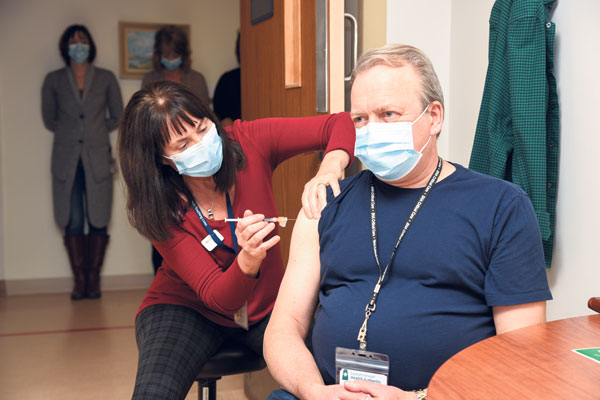
One of the leading vaccine candidates currently in clinical trials could produce its finished product in Canada.
The federal government announced Tuesday that it had signed a memorandum of understanding with Novovax to pursue the production of its COVID-19 vaccine at the National Research Council of Canada’s manufacturing centre in Montreal.
The manufacturing centre is currently under construction and is expected to be completed in July 2021. The facility received a $126 million investment from the federal government in August of 2020.
Once built, it will be capable of large-quantity, end-to-end production of vaccines, about 24 million doses per year depending on the vaccine.
It’s not the only facility in Canada ramping up to produce vaccines here at home.
A manufacturing facility at VIDO Intervac at the University of Saskatchewan is on track to be ready by the end of 2021 and be able to produce up to 40 million vaccine doses annually.
Novavax is the fifth producer of a vaccine candidate to be making good progress on its vaccine. It’s also the second developer, along with Medicago, looking to build long-term capacity for vaccine manufacturing in Canada.
Five days ago, Novavax announced that its vaccine showed an 89.3 per cent efficacy in a phase three trial against the original COVID-19 variant. It also demonstrated about 85.6 per cent effectiveness against the UK variant and 60 per cent efficacy against the South Africa variant.
A vaccine made in Saskatchewan and developed in part by VIDO-Intervac has entered clinical trials, CKOM reported Monday. Clinical trials of that vaccine are being conducted by the Canadian Centre for Vaccinology at Dalhousie University in Halifax.
The updates on those facilities were made in addition to a pair of announcements about investments to support vaccine, therapeutic and biomanufacturing projects in Canada.
The announcements included up to $25.1 million to Precision NanosSystems Incorporated (PNI), a Vancouver-based biotechnology company, to produce ribonucleic acid vaccines and future genetic medicines in Canada including treatments for infectious diseases, rare diseases, cancer and other areas.
The $50.2 million biomanufacturing centre is slated to be ready by 2023 and be able to produce up to 240 million doses of an RNO COVID-19 vaccine each year.
The federal government also announced up to $14 million in funding to Edesa Biotech Inc, a biopharmaceutical company based in Ontario. It’s working on a monoclonal antibody therapy for acute respiratory distress syndrome, the leading cause of COVID-19 deaths. The project has received Health Canada approval to conduct its phase 2 clinical trials and has begun administering its treatment to participants in Canada.
“Every country in the world wants COVID vaccines made in their country,” said François-Philippe Champagne, Minister of Innovation, Science and Technology.
“Buy investing in Canadian research and biomanufacturing capacity, we are advancing safe and effective vaccines and treatments and are strengthening our resiliency to future outbreaks.”
He said the new facilities will also allow Canada to attract more vaccine producers in the future.
“Let’s seize the moment,” he said.
“Let’s be ambitious and let’s quickly expand our biomanufacturing capacity in Canada.”
Canada providing funding to improve vaccine uptake
The federal government also announced funding Tuesday of more than $64 million to increase COVID-19 vaccination uptake. That includes $30.25 million for community-led projects to increase vaccine confidence by addressing knowledge gaps, attitudes and beliefs about vaccination. The remaining $32.5 million will be allocated to provincial and territorial governments to enhance their electronic vaccination registries and improve tracking of uptake Canada-wide.
During a press conference, Anita Anand, Minister of Public Services and Procurement said deliveries of approved vaccines have resumed, with more arriving this week, and about 330,000 expected nation-wide in the next two weeks.
‘After that,” she said, “deliveries will begin to increase sharply.”
She confirmed that all 6 million promised doses from Pfizer and Moderna will arrive and that work with other producers will continue.
Of the government’s 17 vaccine supply agreements, two are approved, three are under review and two are in clinical trials.
“This is a remarkable rate of success for Canada’s vaccine portfolio as a whole,” she said.
“There will be sufficient vaccines by the end of September for everyone in Canada who wishes to receive one.”
Canada has also ordered 64 million of the types of syringes needed to accurately administer the vaccine. That’s in addition to purchases made by provinces and territories.
“I would like to reassure Canadians that my department and myself are working daily to ensure that these vaccines and supplies are delivered as quickly as possible so Canadians can get vaccinated as quickly as possible,” she said.
“These are turbulent times. Our government remains on course and will navigate these waters together.”

